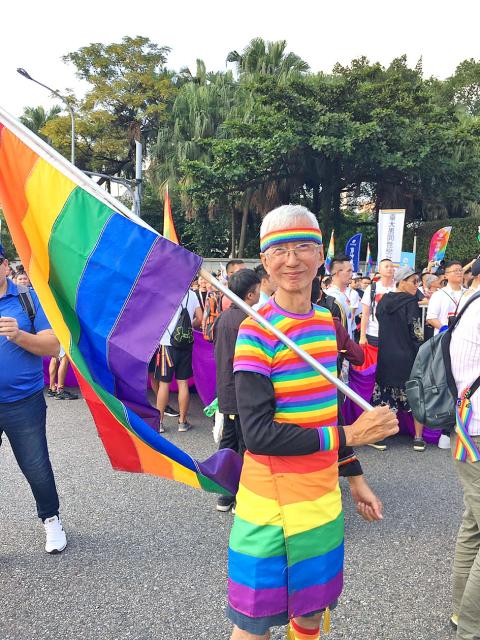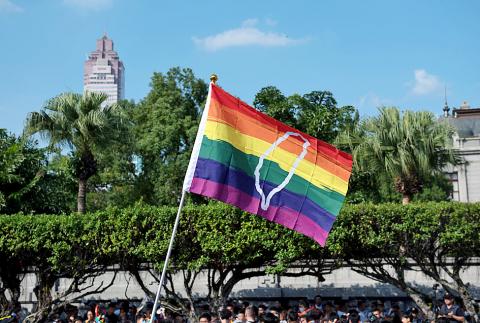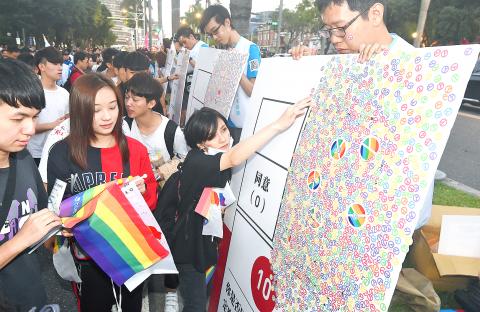Nearly 140,000 people from home and abroad yesterday marched through the streets of Taipei in support of better protection of lesbian, gay, bisexual and transgender (LGBT) rights, calling on Taiwanese voters to “vote for equality” in the five LGBT-related referendums tied to next month’s local elections.
Taipei’s skies were filled with rainbow flags, as participants departed from Ketagalan Boulevard at 2:30pm and headed in three different directions, before congregating back on the boulevard.
According to the rally’s organizers, Taiwan LGBT Pride, the march, now in its 16th year, attracted about 137,000 people, up from last year’s 123,000.

Photo: CNA
Due to the annual parade’s growing popularity in Asia and the world, there has been increasing racial, age and occupational diversity among the participants, the organizers said.
The theme this year was “Tell your story, vote for equality,” as the organizers wanted to draw attention to the importance of gender equality education, while urging young Taiwanese to vote in the referendums on Nov. 24 “to safeguard the rainbow,” said a Taiwan LGBT Pride Community general coordinator, who only identified himself as “Hsiao Pai” (小白).
The five referendums, three of which were initiated by anti-LGBT groups, could decide whether the government would legalize same-sex marriage and whether LGBT-inclusive education will be taught in elementary and junior-high schools.

Photo: Yang Mian-chieh, Taipei Times
Mickey Liu (柳皓恩), 26, who joined the march from Hsinchu, said his parents have known he is gay since he was 19.
“When they found out, our relationship went through a rough period. However, as they learned more about the LGBT community, they came to understand and accept it,” Liu said.
A 48-year-old Japanese man who declined to disclose his name said that he came to Taiwan just for the parade and that he found Taiwanese to be “very nice and open” to people with different sexual orientations.

Photo: EPA / Dave Mark Meguiso
Asked whether he hopes to attend such a parade in his country one day, he said that Japan “is not there yet.”
Liam Arne, a 22-year-old American who has been living in Taiwan for three months, said he is happy to see the progress the nation has made in improving LGBT rights.
European Economic and Trade Office Director Madeleine Majorenko said it was her fourth time attending the Taiwan LGBT Pride Parade, which she called “the greatest party ever.”

Photo: CNA
British Representative to Taiwan Catherine Nettleton said Taiwan is a progressive society in various aspects, with a thriving democracy and media.
She said she hopes the progress made on the issue of marriage equality will evolve into a solid result.
German Institute Taipei Director-General Thomas Prinz said the parade alone is a symbol for a free and democratic society, adding that changes take time and that Taiwan is headed in the right direction.

Photo: Liao Chen-huei, Taipei Times
Prior to the start of the parade, more than 30 church leaders, pastors and theologians from 13 nations, including the US, the Philippines, India, South Korea and Singapore, gathered on the boulevard to voice support for the nation’s lesbian, gay, bisexual, transgender, intersex and questioning (LGBTIQ) community, expressing the hope that the nation sets an example by liberating people who are being oppressed due to their sexual orientation.
The participants included US bishop Yvette Flunder, Malaysian Pastor Ngeo Boon Lin, who is Asia’s first openly gay clergy member with a doctorate in theology, Japanese transgender priest Ambrosia Goto Kaori and Indian intersex social activist Daniel Medonca.
Flunder said people would know that the spirit of God is upon them when they choose to liberate people from bondage, choose relationships over religion, and set people free instead of putting them in chains.
“To all of those who are suffering from the oppression of the church, let me be a witness to you today... I have been in a relationship with my partner for 34 years. She and I got married in the US as soon as we could,” Flunder said.
The participants read out a statement expressing their belief that the heart of the gospel of Jesus Christ is radical love, justice and inclusion, and that each person is precious to God because they are all created in His image.
“We recognize there are people with diverse sexual orientations, gender identities, gender expressions and sex characteristics. We affirm that being LGBTIQ is not a psychological disorder, a mental illness, immoral, evil, sinful or depraved — it is simply a reflection of the amazing diversity that God has created,” they said.
Taiwan LGBT Family Rights Advocacy executive secretary Li Jui-ping (黎璿萍) said that she has been a Christian since junior-high school.
"However, I later left the church because after the pastor found out about my sexuality, he told my parents that I was abnormal,” Li said.
Despite the incident, Li said she has remained a Christian because what she believes in is Jesus Christ and that through him, she sees a family.

AGING: As of last month, people aged 65 or older accounted for 20.06 percent of the total population and the number of couples who got married fell by 18,685 from 2024 Taiwan has surpassed South Korea as the country least willing to have children, with an annual crude birthrate of 4.62 per 1,000 people, Ministry of the Interior data showed yesterday. The nation was previously ranked the second-lowest country in terms of total fertility rate, or the average number of children a woman has in her lifetime. However, South Korea’s fertility rate began to recover from 2023, with total fertility rate rising from 0.72 and estimated to reach 0.82 to 0.85 by last year, and the crude birthrate projected at 6.7 per 1,000 people. Japan’s crude birthrate was projected to fall below six,

US President Donald Trump in an interview with the New York Times published on Thursday said that “it’s up to” Chinese President Xi Jinping (習近平) what China does on Taiwan, but that he would be “very unhappy” with a change in the “status quo.” “He [Xi] considers it to be a part of China, and that’s up to him what he’s going to be doing, but I’ve expressed to him that I would be very unhappy if he did that, and I don’t think he’ll do that. I hope he doesn’t do that,” Trump said. Trump made the comments in the context

SELF-DEFENSE: Tokyo has accelerated its spending goal and its defense minister said the nation needs to discuss whether it should develop nuclear-powered submarines China is ramping up objections to what it sees as Japan’s desire to acquire nuclear weapons, despite Tokyo’s longstanding renunciation of such arms, deepening another fissure in the two neighbors’ increasingly tense ties. In what appears to be a concerted effort, China’s foreign and defense ministries issued statements on Thursday condemning alleged remilitarism efforts by Tokyo. The remarks came as two of the country’s top think tanks jointly issued a 29-page report framing actions by “right-wing forces” in Japan as posing a “serious threat” to world peace. While that report did not define “right-wing forces,” the Chinese Ministry of Foreign Affairs was

PREPAREDNESS: Given the difficulty of importing ammunition during wartime, the Ministry of National Defense said it would prioritize ‘coproduction’ partnerships A newly formed unit of the Marine Corps tasked with land-based security operations has recently replaced its aging, domestically produced rifles with more advanced, US-made M4A1 rifles, a source said yesterday. The unnamed source familiar with the matter said the First Security Battalion of the Marine Corps’ Air Defense and Base Guard Group has replaced its older T65K2 rifles, which have been in service since the late 1980s, with the newly received M4A1s. The source did not say exactly when the upgrade took place or how many M4A1s were issued to the battalion. The confirmation came after Chinese-language media reported